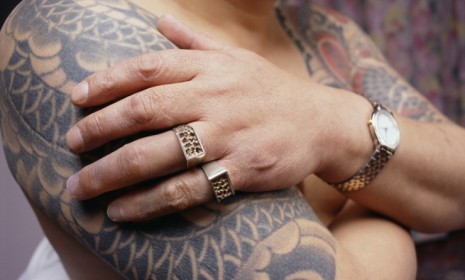Obama vs. the yakuza
The U.S. imposes financial sanctions on the Japanese mob — but will the Japanese government cooperate?

A free daily email with the biggest news stories of the day – and the best features from TheWeek.com
You are now subscribed
Your newsletter sign-up was successful
Japan's yakuza gangsters are known for their iconic traditions, such as sporting elaborate full-body tattoos, and chopping off their own pinky fingers as a form of penance. But the yakuza are also emerging as thoroughly modern criminal syndicates with global reach. That's why the U.S. Treasury is imposing sanctions on Japan's largest yakuza clan, the Yamaguchi-gumi. While the sanctions target gangsters, they could also have serious implications for the yakuza's partners — which include Japanese businessmen and politicians. Here, a guide to the standoff:
Why is the U.S. going after Japanese gangs?
The Treasury Department says the Yamaguchi-gumi is involved in drug smuggling, human trafficking, prostitution, and money laundering in the U.S., mostly in Hawaii and California. Investigators say the group has a significant presence in global markets, and uses the U.S. financial system to invest its "illicit proceeds." The sanctions are meant, in part, to protect U.S. companies from "unwittingly" supporting illegal activity.
The Week
Escape your echo chamber. Get the facts behind the news, plus analysis from multiple perspectives.

Sign up for The Week's Free Newsletters
From our morning news briefing to a weekly Good News Newsletter, get the best of The Week delivered directly to your inbox.
From our morning news briefing to a weekly Good News Newsletter, get the best of The Week delivered directly to your inbox.
What do the sanctions do?
The sanctions freeze the Yamaguchi-gumi's American assets, and bar it from doing business in the U.S. The sanctions also target the group's leaders: Kenichi Shinoda, the 70-year-old godfather, and his deputy, Kiyoshi Takayama. Considered a charismatic figure, Shinoda was freed from a Japanese prison in April 2011 after serving six years on a weapons possession charge. Previously, he had gone to jail for killing a rival gangster with a samurai sword.
How large a presence do the gansters have in Japan?
There are an estimated 80,000 yakuza members in Japan, about half of whom are linked to the Yamaguchi-gumi. The group is known as the Walmart of the yakuza, because of its ability to drive opponents out of business and rake in large profits. Shinoda, in particular, is credited with aggressively expanding the group's activities, establishing it as a force behind numerous front companies.
A free daily email with the biggest news stories of the day – and the best features from TheWeek.com
Why is the U.S. targeting the yakuza now?
The sanctions come under an executive order that Obama issued in July 2011 (and just executed in recent days), which targets criminal organizations that "constitute an unusual and extraordinary threat to the national security, foreign policy, and economy of the United States." In addition to the yakuza, the Camorra mob family in Italy and the Zetas drug cartel in Mexico are named in the order.
What is Japan's position toward organized crime?
The Japanese government recently pledged to crack down, reversing a longstanding policy of tolerating the Yakuza. However, the yakuza syndicates enjoy extensive influence in the business community, and the Yamaguchi-gumi has ties to some of Japan's biggest companies, including Olympus and TEPCO. The Yamaguchi-gumi also is an important backer of the Democratic Party of Japan, which heads the government's ruling coalition.
Will Japan go along with the sanctions?
Japan reacted with "shock and shame" to Obama's 2011 executive order, Jake Adelstein, an expert on the yakuza, tells Foreign Policy. The latest sanctions are a "slap in the face" urging Japan to tackle its problems with organized crime. But so far, Japanese police appear unwilling to cooperate, hindering America's ability to even identify yakuza members. It will continue to be a problem: "With so many Japanese companies invested in the U.S. and with so many American companies investing in the Japanese stock market, which is yakuza infested," Adelstein says, "it becomes a matter of U.S. national security."
Sources: Foreign Policy, Guardian, NY Times, Telegraph, Wall St. Journal
-
 Local elections 2026: where are they and who is expected to win?
Local elections 2026: where are they and who is expected to win?The Explainer Labour is braced for heavy losses and U-turn on postponing some council elections hasn’t helped the party’s prospects
-
 6 of the world’s most accessible destinations
6 of the world’s most accessible destinationsThe Week Recommends Experience all of Berlin, Singapore and Sydney
-
 How the FCC’s ‘equal time’ rule works
How the FCC’s ‘equal time’ rule worksIn the Spotlight The law is at the heart of the Colbert-CBS conflict